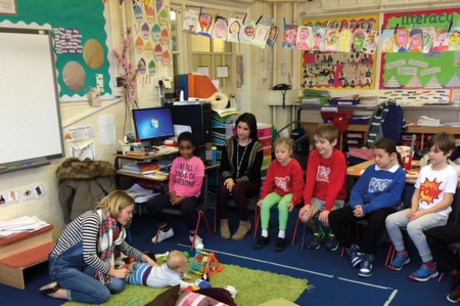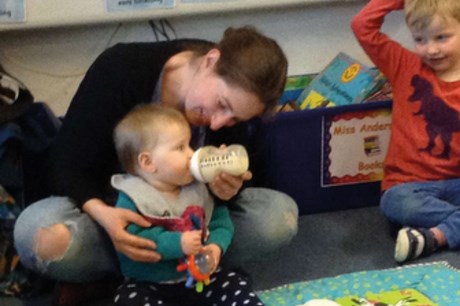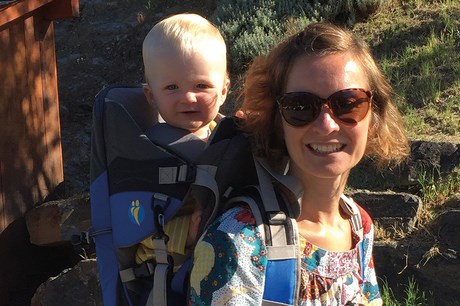Learning & Development: Babywatching - Hello, baby!
Griselda Kellie-Smith and Andrea Perry
Monday, October 3, 2016
The increasingly popular BASE Babywatching programme aims to boost children’s empathy in order to tackle violence in schools and beyond. Griselda Kellie-Smith and Andrea Perry explain how it works

BASE Babywatching is a simple and effective programme designed to promote empathy among children and reduce classroom aggression. BASE stands for Babywatching Against Aggression andAnxiety, for Sensitivity and Empathy. When the programme runs, a warmer atmosphere is created in which children can feel safe to settle, to learn and to make trusting relationships.
Benefits of the scheme extend beyond the classroom, with children developing sensitivity and empathy to people generally, not just their classmates. Participants have also been reported to sleep better, their concentration improves, they are less fearful in their interactions, and when upset they ask for help more easily.
The programme was developed by Dr Karl-Heinz Brisch, head of the Department of Paediatric Psychosomatics and Psychotherapy at the Dr von Hauner Children’s Hospital at the University of Munich. However, it also draws on the work of US psychiatrist Dr Henri Parens, whose family history of persecution during WWII had left him determined to find ways to enable children to grow up as empathic individuals.
There are now many BASE Babywatching groups in Austria, the Netherlands, New Zealand, Israel, the Isle of Man and Germany, where the programme has been adopted in nurseries and kindergartens throughout Frankfurt, which has a high rate of violent crime.
In the UK, the first BASE Babywatching pilot group started in 2011, while the first training programme for group leaders was held in 2012 and attracted 41 participants. A second cohort of 38 group leaders was trained in 2013, along with the UK's first group of mentors, whose role is to support group leaders as they set up, facilitate and manage their Babywatching groups. Training sessions in Edinburgh followed, and London training sessions continue each year. With more trainers now available in the UK, courses can be arranged wherever there is an interest in starting a group.
There are currently many Babywatching groups running successfully in the Isle of Man, Leicestershire, Brighton and London.

INTRODUCING THE SCHEME
A nursery or school wishing to have a Babywatching group can first send a staff member to be trained as a BASE Babywatching group leader. The training involves a comprehensive introduction to the principles behind the programme, and practical experience of the core techniques.
Back at the school or nursery the group leader will find a parent with a baby of a few weeks old willing to come to join a class or group of children once a week for 20 to 30 minutes for one or more terms. The parent is usually the baby’s mother, but it could be the father or a grandparent. The mother and baby interact with each other as usual, playing, cuddling, changing nappies, feeding, singing; sometimes the baby might even sleep.
The group leader invites the children to observe what the mother and the baby are doing, to feel and imagine their way into the mother and baby’s motivations and emotions, and to share their observations with the group. The leader’s invitation is in the form of a series of gentle questions, which gradually enable the children to deepen the level of their observations as the weeks go by. The questions follow a particular sequence:
• First, the group leader asks the children to notice what’s happening at a physical level. ‘What is the mummy doing?’ ‘What is the baby doing with his toes?’ ‘What is the baby looking at?’
• The children are then invited to think about why the parent and baby are doing what they are doing in order to enter their world of motivation. ‘Why is the baby smiling at his daddy?’ ‘Why is the mummy stroking the baby’s cheek?’
• The next level of questions address feelings. ‘How does the baby feel when the mummy strokes him?’ ‘How do you know the baby feels that?’ ‘ How does the daddy feel when his baby is smiling at him?’ ‘Why do you think the daddy feels that way?’ In this way, the children are enabled to develop their empathic capacities, projecting their own experience into the parent and baby.
• The final level is where the children are asked to make associations with their own experience. ‘How would you feel if you had your cheek stroked like that?’ ‘What would you feel if you knocked down that tower of bricks?’ ‘What would you want your mummy to do if you were hungry?’
The group leader deepens the level of questions as the weeks go by, sensitively following the children’s observations and ideas. Even very young children can be supported to deepen their understanding and ability to empathise with what is happening between the parent and baby.

ENJOYMENT AND CHALLENGE
Most children very much enjoy BASE Babywatching, and teachers and group leaders speak of the children’s enthusiasm for taking part. For some children who have experienced a difficult early start in life, it can be challenging to watch a mother being tender with her baby, and they may become distressed. Of course, this could equally happen in a public setting, where a child being upset at another child or baby receiving kind attention and care might be ignored or unnoticed. If it happens in a BASE Babywatching group in a nursery or school setting, it is possible for the adults to pick up on this distress, and to look after and work appropriately with the child.
Parents bringing their baby to BASE Babywatching groups have also enjoyed participating, not only because their babies seem very settled within the group, but also because they find hearing the children’s observations, and the group’s appreciation and welcome of them and their baby, heartwarming.
CONTINUING THE SCHEME
Throughout the course of the BASE Babywatching programme, the group leader receives mentoring from a trained BASE Babywatching mentor. The leader will then receive registration from the BASE Babywatching network.
After a year of running a group, the group leader can train as a mentor, who can then support future group leaders within the setting. Thus within two years, a school or nursery can become self-sufficient in its capacity to run BASE Babywatching groups, while keeping contact with Dr Brisch and the BASE Babywatching network in Germany and in the UK.

CASE STUDIES
Lily Chippendale and her son Syd (above), Patcham Infants School, Brighton
‘Taking part in Babywatching was a special experience for my son Syd and me. We started when he was four months old and our visits became a lovely part of our week for around four months.
‘I simply enjoyed feeding, changing and playing with Syd without thinking too much about the six- and seven-year-olds’ observations. Having them witness all the little behaviours and nuances of what we did was extremely validating as a new mum.
‘I noticed over the weeks that the children were really thinking about our feelings and actually growing quite attached to Syd. It was interesting for me to see how Syd’s focus changed – how his interest outside our mummy-and-baby bubble increased. It was great to return at the end of the school year for the children to see how much Syd had grown.’
Alison Powell, SENCO, Royal Spa Nursery School, Brighton
‘I knew straight away that Babywatching would work well at our nursery. Not all young children develop empathy and some hit, bite and don’t want to be with other children. Many also have new siblings, which is often a difficult time. We targeted some of these children and also some who exhibit good empathy who could model it.
‘We found that the programme is more aimed at older children so we adapted it slightly. At first we had 13 children in the group, which was far too large for them to be able to listen to each other and wait their turn to speak, so we reduced it to up to eight children, which worked well.
‘We ran 15-minute sessions with the mother and baby once a week for 12 weeks. The children found it fascinating and it was really interesting to see them mimic the mother’s behaviour – if the mum hugged the baby, I’d see the children hug themselves. Children would comment on what was happening, why and how the baby was feeling. They said lovely things such as, “He’s happy because his mum is touching him” and, when the baby was crying, “I think he’s missing his daddy.”
‘We noticed that children became more sensitive to others’ needs. One boy who did not like socialising changed totally after a few sessions. He started to talk and ask more questions in the sessions. It was as if being part of the Babywatching group enabled him to start feeling more part of the nursery group. He also started to be kinder towards other children. A mother commented that her child behaved better with their new sibling at home.
‘Other children in the setting were interested in the sessions so we made a photo book to show them what happened. I love the simplicity of the sessions. Babies are fascinating and we are naturally drawn to them. Babywatching worked so well in our nursery that I’m now training to lead groups myself.’
MORE INFORMATION




